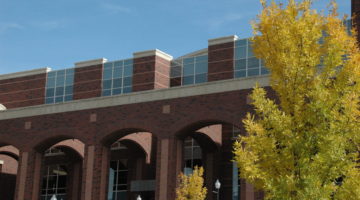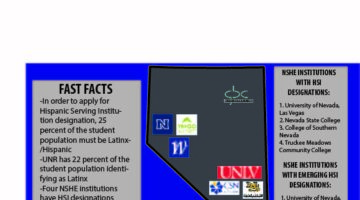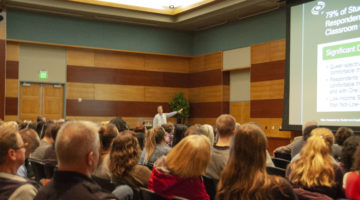The Associated Students of the University of Nevada is made up of 30 plus students who serve as the gatekeepers for important decisions that impact the entire student body. Made up of the executive, judicial and legislative branches, ASUN is here to find the best interests of the students and implement them. However, with election filing this week, will ASUN start to resemble the student body more?
Currently, ASUN is split right down the middle (13 to 13) between both males and females (this includes the president, vice president and senators) and is about even with the current university ratio (47 percent male to 53 percent female, according to demographic information published by the university). However, the majority of the elected officers (about 54 percent, according to Dennis Campbell, coordinator of Fraternity & Sorority Life) are a part of Greek life, which only accounts for 8.7 percent of the active student body. About 15 percent (2,276) of students are part-time, but there are no part-time students on board for ASUN. Finally, the average age of students at Nevada is around 23.8 years old, which is higher than the average for ASUN, although this might be due to the fact that a significant percentage of Nevada students are graduate students and would skew the ratings. Nonetheless, ASUN still lacks in diversity, but is that any fault of its own or just the student body’s own apathy?
ASUN has been trivialized in recent years (and possibly longer) by the student body at large with a certain, “who cares?” attitude. Many students at the university are just too busy to think about ASUN’s affairs even if they directly impact their own. The new student fitness facility is a direct example of that, as only about 27 percent of the student population voted on this issue. There is also a lack of variety when it comes to members of ASUN: There are no non-traditional students (any student that is not full time, came to university out of high school and will matriculate in four years), students with disabilities, ones who are affiliated with the residence halls or otherwise. However, ASUN cannot simply pluck these students from the undergraduate population. Instead it is up to them to show up to election filing.
Which brings us to the point of running for a position inside of ASUN. Are there too many barriers to entry? With a senate full of Greeks and President Rashdan’s cabinet made up of WASB’s (White, Anglo-Saxon, Business majors) this would seemingly make it harder for an unaffiliated student to run for an elected position. Of course, having your cabinet full of people with similar interests is fine if they are fulfilling their duties, but it raises the issue of nepotism to the outside. Although, this might not be all ASUN’s fault. If the students don’t run and the same members of the student body continue to fill these positions, then ASUN is not to blame.
ASUN should represent the student population as best they can, but if the students don’t apply to be members-at-large or elected officials, vote on large issues at the university or become part of the campus community, then it leaves the other students little room to complain about issues that affect everyone. ASUN must also do its due diligence to find as diverse of a cast of officials who are qualified and dedicated. Our university is incredibly diverse and it deserves to be represented as such on both ends.
The Nevada Sagebrush editorial staff can be reached at editor@http://archive.archive.nevadasagebrush.com.












